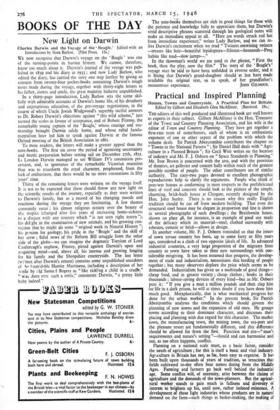BOOKS OF THE DAY
New Light on Darwin
Charles Darwin and the Voyage of the • Beagle.' Edited with an Introduction by Nora Barlow. (Pilot Press. 15s.) WE now recognise that Darwin's voyage on the ' Beagle ' was one of the turning-points in human history. We cannot, therefore, know too much about it. Darwin's journal of the voyage was pub- lished in t839 and his diary in 1933 ; and now Lady Barlow, who edited the diary, has carried the story one step further by giving us extracts from twenty-four pocket-books containing Darwin's rough notes made during the voyage, together with thirty-eight letters to his father, sisters and uncle, the great majority hitherto unpublished.
In a thirty-page introduction, Lady Barlow sets the scene skil- fully with admirable accounts of Darwin's home life, of his desultory and unpropitious education, of the pre-voyage negotiations, in the course of which Uncle Josiah Wedgwood's superbly tactful answers to Dr. Robert Darwin's objections against " this wild scheme," just turned the scales in favour of acceptance, and of Robert Fitzroy, the remarkable young captain of the ' Beagle,' whose courage and sea- manship brought Darwin safely home, and whose rabid funda- mentalism later led him to speak against Darwin at the famous Oxford meeting of the British Association in 1861.
To most readers, the letters will make a greater appeal than the note-books. The first six cover the period of agonising uncertainty and hectic preparation before setting sail on December 27th, 1831. In London Darwin managed to see William IV's coronation pro- cession, and, in ignorance of the remarkable Victorian mutation that was to transform the royal character, prophesied, from the lack of enthusiasm, that there would be no more coronations in fifty years' time.
Thirty of the remaining letters were written on the voyage itself. It is not to be expected that these should throw any new light on the scientific results of the journey, especially as they were written to Darwin's family, but as a record of his changing moods and reactions during the voyage they are fascinating. A few themes constantly recur ; his almost religious ecstasy over the beauty of the tropics (changed after five years of increasing home-sickness to a disgust with any country which " is not seen right astern "); his delight in the examination of new animals, and his growing con- viction that he might do some " original work in Natural History "; his prssion for geology; his pride in the ' Beagle' and the skill of her crew ; fitful news of the Reform Bill struggle from the other side of the globe—we can imagine the dogmatic Toryism of Lord Castlereagh's nephew, Fitzroy, pitted against Darwin's open and enquiring mind—and, above all, his intense and growing longing for his family and the Shropshire countryside. The last letter (written after Darwin's return) contains some unpublished anecdotes of 11-_. formidible Harriet Martineau, including a description of her s nile by cld Samu Rogers as " like tickling a child in a cradle." " Was there ever such a smile," comments Darwin, "a pretty little baby indeed."
The note-books themselves are rich in good things for those with the patience and knowledge fully to appreciate them, but Darwin's vivid descriptive phrases scattered through his geological notes will make an immediate appeal to all. "Here are words struck red hot from immediate experience," writes Lady Barlow, and we can re- live Darwin's excitement when we read " Twiners entwining twiner& —tresses like hair—beautiful lepidoptera—Silence—hosannah—Frog habits like toad—slow jumps—."
In the showman's world we are used to the phrase, " First the book, then the play, now the film." The story of the ' Beagle's' voyage may be said to have been unfolded in reverse order, and it is fitting that Darwin's grand-daughter should at last have made available the original text, so to speak, of her grandfather's


























 Previous page
Previous page